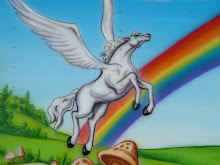In both Perfume and The Crucible the main theme that revolves around both these pieces of literature is the theme of good versus evil. Although these novels do not have a conventional approach to the theme of good and evil. There are no solely good characters in both Perfume and The Crucible because all characters exemplify evil tendencies one way or another thus making the approach to “Good Versus Evil” unconventional.
In typical good versus evil themes, there is always a good set of characters and an evil set of characters, and either the good characters are introduced first or the evil characters. In the end the evil characters or character is usually stopped by the “good” characters at any cost. In both The Crucible and Perfume there are no good characters that put a stop to the evil characters. For example in Perfume Grenouille was the evil protagonist who had gotten exactly what he wanted and nobody was able to stop him. Grenouille had made the “ultimate perfume” and there was not a single person who could put a stop to him. Once Grenouille had accomplished this perfect scent, he killed himself, and not by the means of some “good” characters like what happens in most conventional approach, but he died on his own terms and nobody else’s. In The Crucible just like Perfume, nobody was able to stop Abigail and all her lies. Abigail got exactly what she wanted.
In most conventional pieces of literature that deal with the theme of “Good Versus Evil,” there is always an evil antagonist that is introduced in a clear way. In Perfume the protagonist happened to be the evilest of characters in the entire novel, and the same goes for The Crucible. It was clear even at the beginning of the novel that Grenouille, the main character in Perfume was going to slowly develop into a cold hearted, relentless and evil character. Through many evil actions it was clear that Grenouille was going down a dark path. In the beginning of the novel Grenouille encountered a special scent from a girl and he just had to kill her. Grenouille had murdered her like it was no big deal at all and had done it for no good reason. This killing was a “spark to his flame,” because eventually Grenouille killed 25 other girls in a similar way in order to make the “ultimate scent.” Similarly in The Crucible, Abigail, the antagonist was clearly an evil character, she got her ways through lies and deceit. Abigail was fully lying about what was going on in the woods. Abigail is always yelling, and she seems to always be in the middle of all the problems. Abigail also framed Elizabeth for stabbing her. Abigail seemed to be pretty happy that the three individuals were hanged to death, which is very “evil-like,” especially considering she knows she’s lying and she knows those people did not deserve to die. Both authors did a good job in clearly portraying the main evil characters.
Just like most conventional approaches have an evil antagonist, most conventional approaches have a solely “good” protagonist that does everything in his or her power to put a stop to the evil character(s). That is entirely not the case with Perfume and The Crucible. In Perfume there are no solely good characters, only seemingly good characters that have evil thoughts and do evil-like actions which in fact make them “lesser-evil” Baldini one of the character in Perfume who at first seems “Good” is a perfect example of this. Baldini was a great perfumer who was about to quit perfuming. Baldini gave Grenouille a chance to prove himself even though there were so many negative factors against Grenouille. Up until this point it is clear that Baldini was a good character who had a heart. Although once Grenouille fell fatally ill, the only thing on Baldini’s mind was his precious business and how if he lost Grenouille his business would plummet. Baldini had taken care of Grenouille well, and never left his side. “Baldini would have loved to throttle him, to club him to death, to beat those precious secrets out of that moribund body.” (Suskind, 107) That exact quote gives the reader a clear indication that Baldini may appear to be “good” but he is in fact “evil.” There is a similar case in The Crucible. John Proctor was portrayed as a good character with no evil tendencies once so ever. Although in some of the scenes John Proctor handled Abigail with such ruthless aggression and anger. He would always throttle her, yell her and almost had absolutely no sympathy for her at all. In the movie in one of the scenes it was pitch black; and the camera was angled in such a way that showed that John Proctor was about to do something so entirely lethal and evil. This was also after Elizabeth was taken away because of Abigail. This clearly shows that even characters that may seem to be 100 percent evil can in fact have evil tendencies that can in fact make them no where near good.
Overall it is clear that there are not really any solely good characters in both Perfume and The Crucible, and the author’s of both novels had an unconventional approach to the theme of “Good Versus Evil.” Justice had not prevailed in either of these two pieces of literature.
Sunday, May 10, 2009
Subscribe to:
Posts (Atom)
